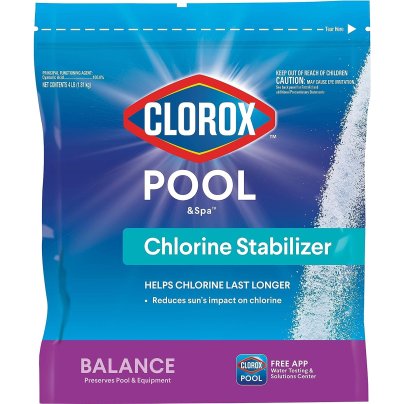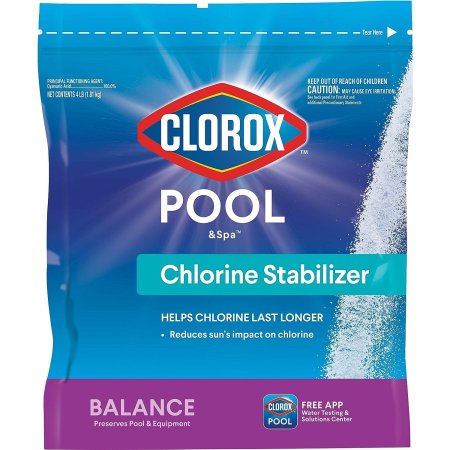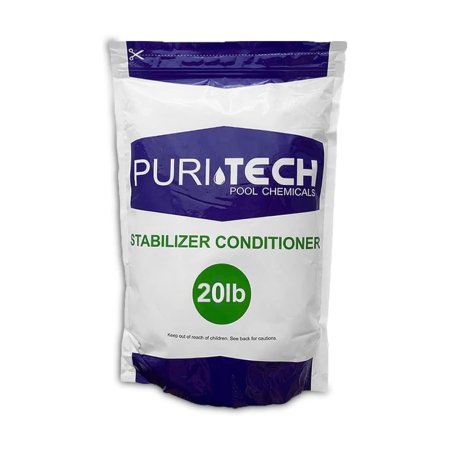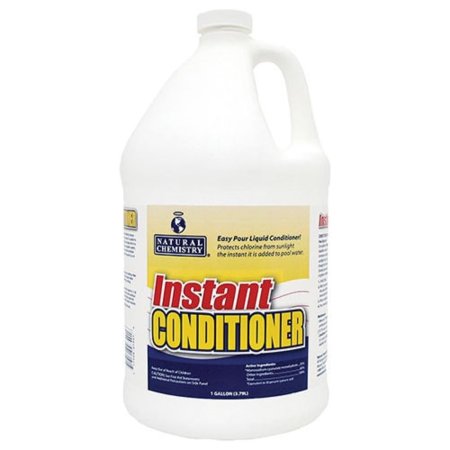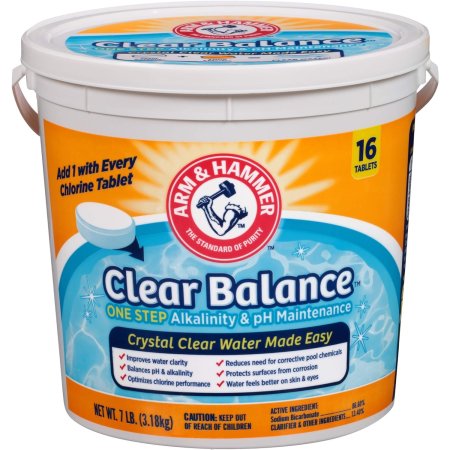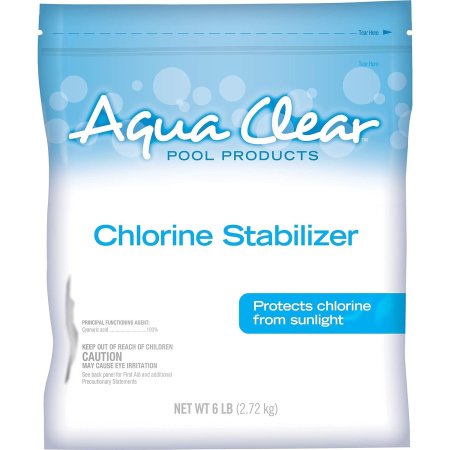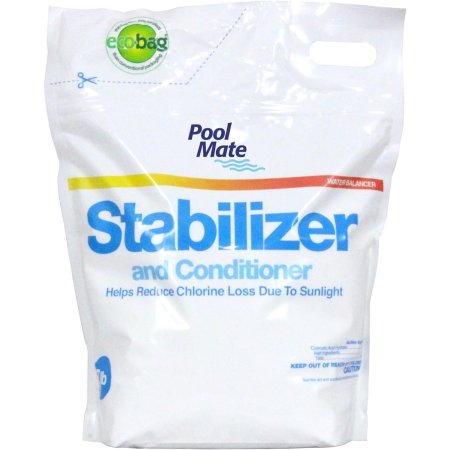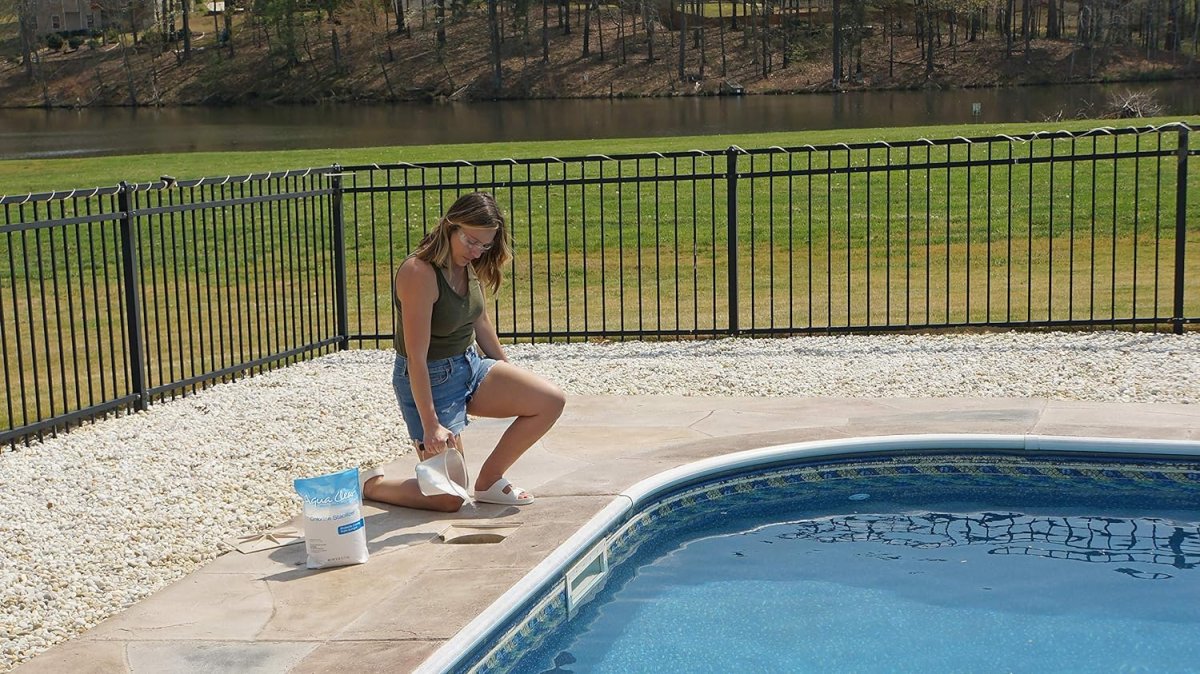
We may earn revenue from the products available on this page and participate in affiliate programs. Learn More ›
Chlorine is an essential disinfectant to keep swimming pool water clean and clear, but to get the most out of this chemical, it’s important to pair it with a good pool stabilizer. If left untouched, typical chlorine in pool water will degrade and deteriorate under the sun’s ultraviolet (UV) rays, decreasing its effectiveness. Pool stabilizers—also known as cyanuric acid or pool conditioners—can protect chlorine from sunlight, reducing the need for frequent replacements and saving pool owners both time and money.
Like chlorine itself, pool stabilizers can come in a few variations. Liquid and granular stabilizer generally consists of pure cyanuric, which can be added to pool water in addition to any chlorine tablets or powder being used. However, some pool owners may prefer stabilized chlorine, which incorporates both compounds in the same tablet or powder and may be more convenient than granular or liquid options alone. In this guide, we suggest the best pool stabilizers on the market as well as offer some important tips for getting the most out of them in your pool.
- BEST OVERALL: Clorox Pool and Spa Chlorine Stabilizer
- BEST BANG FOR THE BUCK: PuriTech Acid Stabilizer and Conditioner
- BEST LIQUID: Natural Chemistry Instant Pool Water Conditioner
- BEST TABLETS: Arm & Hammer Clear Balance Pool Maintenance Tablets
- BEST FOR SALTWATER POOLS: Aqua Clear Pool Products Chlorine Stabilizer
- ALSO CONSIDER: Pool Mate Pool Stabilizer and Conditioner
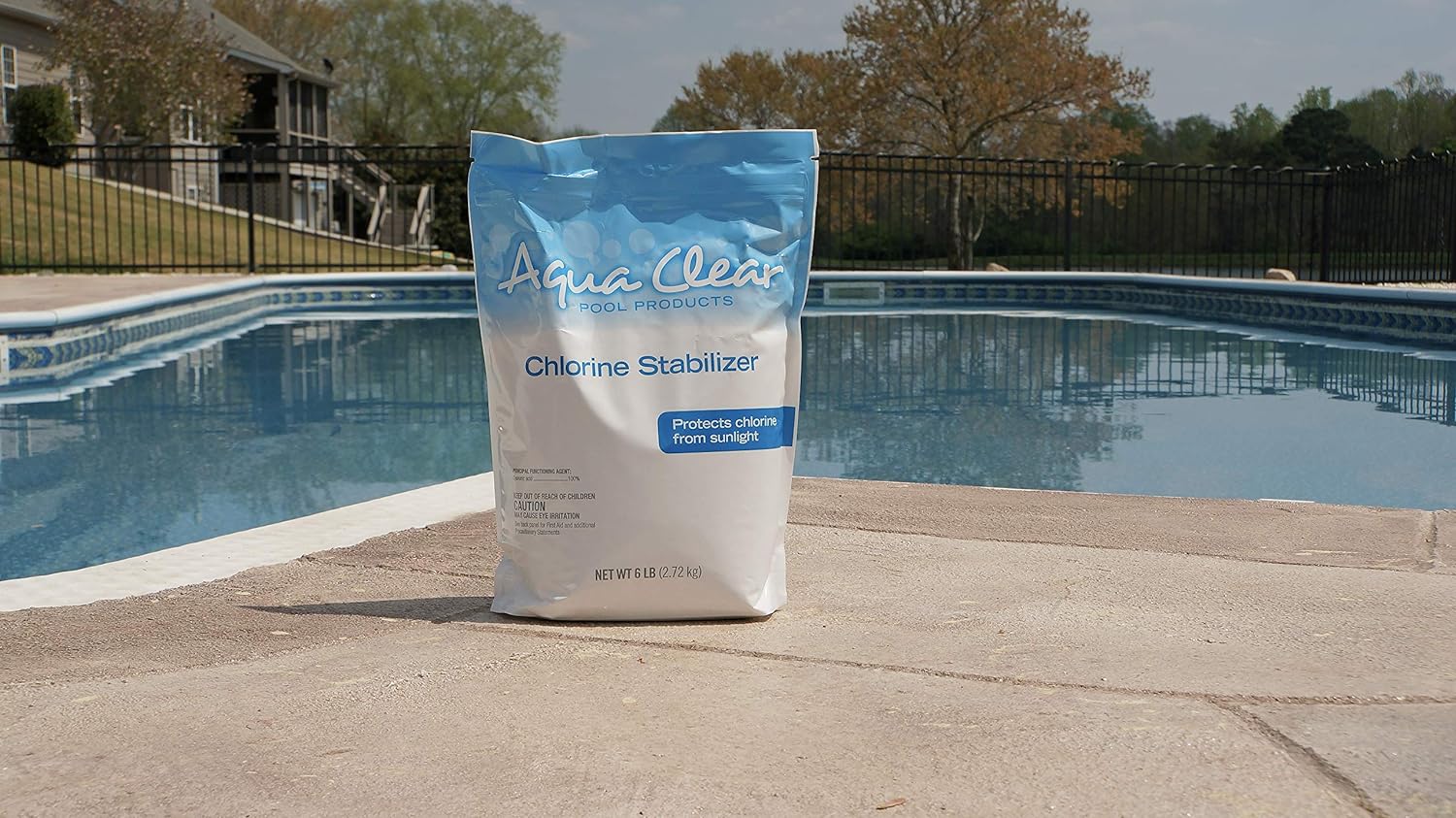
How We Chose the Best Pool Stabilizers
Pool stabilizers are essentially pure cyanuric acid in either granular or liquid form, which can make distinguishing between products difficult. To better understand the nuances of each product, we looked at a range of sources and tried to hone in on subtle differences between them. We first reviewed the manufacturer’s description of the product, taking into account its specifications and intended use. We then sought out firsthand reviews from people who used the product, including experts and everyday consumers, hoping to glean how it performed in real-world scenarios. We weighed the pros and cons of each type of stabilizer, whether granular or liquid. And we also considered other product features that might impact a buyer’s decision, including quantity, packaging, and cost.
Our Top Picks
Using the process described above, we were able to narrow down the dozens of pool stabilizer brands on the market to the best of the best. These include options suitable for a range of applications, from standard above-ground pools to inground saltwater ones.
Best Overall
Clorox Pool and Spa Chlorine Stabilizer
Pros
- Can be used in both fresh and saltwater chlorine pools
- Flexible application works both via skimmer and when directly added to the deep end of the pool
- Free Clorox app gives experts tips and guidance to get the most out of product
- Can be paired with other Clorox pool cleaning products, including test kit and chlorine tablets
Cons
- A bit more expensive than other options
- May take some time to dissolve if applied directly to water
- Requires testing to determine exact pH balance before use
Product Specs
- Form: Granular
- Quantity: 4-pound bag
- Recommended application: Skimmer or deep end
Clorox’s pool stabilizer is a popular option from a trusted brand in disinfectants and cleaning products. The 4-pound bag contains 100 percent cyanuric acid in granular form, making it a good option for standard-size pools that require regular maintenance throughout the season. Just 1 pound of stabilizer treats up to 4,000 gallons of pool water at Clorox’s recommended 30 parts per million (ppm). It’s also suitable for pools treated with both liquid chlorine and chlorine tablets, as well as for saltwater pools treated with any kind of chlorine.
Buyers can download Clorox’s free app to get instructions for how to use its stabilizer as well as other expert advice for general pool maintenance. That makes it a great option for beginners who may be new to pool cleaning and in need of some extra guidance. It’s worth noting that Clorox recommends using this stabilizer in a skimmer, but it can also be added directly to water in the deep end of a pool. For a comprehensive pool maintenance routine, users can pair the stabilizer with other Clorox pool cleaning products, including chlorine tablets and test kits.
Get the Clorox pool stabilizer at Amazon, Lowe’s, or Walmart.
Best Bang For The Buck
PuriTech Acid Stabilizer and Conditioner
Pros
- 20-pound bag contains enough stabilizer to treat large pools throughout the year
- Resealable bag preserves potency of acid in storage
- 1 pound can raise cyanuric acid levels by 10 ppm
- Also available in larger and smaller quantities for user convenience
Cons
- Recommended to be used with skimmer, so may not be ideal for small above-ground pools
- Must be left to dissolve over the course of 48 hours
- Crystals are a bit larger than other brands, which may take more time to dissolve
Product Specs
- Form: Granular
- Quantity: 20-pound bag
- Recommended application: Skimmer or deep end
For pool cleaning professionals or property owners who must maintain large inground pools throughout the year, this oversize bag of cyanuric acid from PuriTech is an affordably priced quality option. The 20-pound bag of granular stabilizer is enough to treat almost 80,000 gallons of water, with 1 pound able to raise the cyanuric acid levels of a 10,000-gallon pool by roughly 10 ppm. That large quantity and concentrated power allow pool owners to easily achieve precise levels of cyanuric acid in pools of varying sizes, helping to keep chlorine protected and the water crystal clear.
PuriTech’s stabilizer comes in a resealable bag that makes it easy to store the product when not in use. The brand recommends that the stabilizer be applied twice a year through a skimmer with circulation pump, allowing the product to dissolve over 48 hours. Unfortunately, that makes it a less-than-ideal option for above-ground pools without filters. The stabilizer also comes in a few different quantities, including 5- and 25-pound bags.
Get the PuriTech pool stabilizer at Amazon.
Best Liquid
Natural Chemistry Instant Pool Water Conditioner
Pros
- Mild pH of 8.0 won’t cause damage to pool equipment
- Liquid form dissolves on contact with water and begins working instantly
- Won’t clog pool filters or damage lining like some granular options
- Great for above-ground pools without filters or skimmers
Cons
- More expensive than granular options
- Some users found salt less effective than cyanuric acid
- May not be quite as effective as cyanuric acid depending on environmental factors
Product Specs
- Form: Liquid
- Quantity: 1 gallon
- Recommended application: Directly into water
While cyanuric acid is by far the most trusted solution for protecting chlorine from damaging UV rays, it’s not the only option. One alternative is this pool stabilizer and conditioner from Natural Chemistry, which consists not of cyanuric acid but salt. It’s also a liquid stabilizer, allowing it to be poured directly into pool water where it begins working instantly, unlike granular products that take time to dissolve. Just 1 gallon treats around 10,000 gallons of water, which is roughly on par with the performance of granular stabilizers.
Natural Chemistry’s salt-based stabilizer touts other benefits, too. Because it’s a liquid that dissolves on contact with water, it won’t clog or damage pool filters or linings like some granular options might. That also means it begins protecting chlorine faster than granular options, which must be fully dissolved to take complete effect. It is a bit more expensive than standard granular products, but that may be a small price to pay for the added convenience of a fast-acting liquid stabilizer.
Get the Natural Chemistry pool stabilizer at Amazon.
Best Tablets
Arm & Hammer Clear Balance Pool Maintenance Tablets
Pros
- Convenient tablet form requires no measuring or messy application
- Keeps pH and alkalinity levels in check while also improving performance of chlorine
- Resealable bucket container keeps tablets fresh; also comes in larger 24-tablet option
Cons
- More expensive than cyanuric acid options
- Doesn’t protect chlorine from deterioration under sunlight
- Tablets may easily break apart inside bucket
Product Specs
- Form: Tablet
- Quantity: 16
- Recommended application: Skimmer
In addition to extending the life of chlorine tablets by protecting them from the sun, some pool stabilizers are designed to effectively balance other factors that affect water quality. Arm & Hammer Clear Balance tablets, for example, feature a baking soda–based formula intended to maintain the pH and alkalinity levels in swimming pools. Low pH levels can lead to high acidity in pool water, which can sting skin and eyes and corrode pool linings and equipment; these tablets are designed to keep those levels in check while ensuring chlorine performance.
Unlike loose granular or liquid options, Arm & Hammer’s stabilizer comes in convenient tablet form, requiring no measuring or special tools for application. Just add one tablet for each tablet of chlorine to a pool skimmer and let it dissolve on its own. Each bucket contains 16 tablets and is resealable, keeping the product fresh throughout the season.
Get the Arm & Hammer pool stabilizer at Amazon or Walmart.
Best For Saltwater Pools
Aqua Clear Pool Products Chlorine Stabilizer
Pros
- Safe for use in saltwater pools as well as inground and above-ground fresh water ones
- Fine consistency helps it dissolve faster than some other granular stabilizers
- Resealable bag keeps contents fresh in storage
- 1 pound treats 4,000 gallons of water
Cons
- Only comes in 6-pound bag quantity
- Requires 24 hours of circulation after application
Product Specs
- Form: Granular
- Quantity: 6-pound bag
- Recommend application: Skimmer or deep end
Saltwater pools may not be chlorinated the same way as typical fresh water pools but, contrary to popular belief, they are still chlorinated. Most salt water pools use a salt cell to separate sodium from chloride, which can degrade in the sun just like chlorine added to fresh water pools. Aqua Clear’s pool stabilizer is one of the best options for ensuring this chlorine remains effective, particularly in saltwater pools.
Aquar Clear’s fine granular consistency allows it to dissolve more quickly and easily than some other cyanuric acid stabilizers. It comes in a resealable 6-pound bag and can be added to a pool skimmer in a sock and left to dissolve over the course of a few days; it can also be poured directly into the deep end of the pool. The product is safe to use in above- and inground fresh water pools as well as saltwater ones.
Get the Aqua Clear pool stabilizer at Amazon.
Also Consider
Pool Mate Pool Stabilizer and Conditioner
Pros
- Range of bag sizes offer options for small and large pools
- Very effective at reducing chlorine consumption (up to 25 percent)
- Works in saltwater as well as fresh water chlorine pools
- Manufacturer provides very clear and concise instructions for use, a boon to new pool owners
Cons
- Can take a long time to dissolve in skimmer
- Can lead to high levels of cyanuric acid and “chlorine lock” if not properly applied
- Slightly more expensive than similar options
Product Specs
- Form: Granular
- Quantity: 7-pound bag (plus various other sizes)
- Recommended application: Skimmer or deep end
The Pool Mate stabilizer and conditioner is another granular stabilizer that can be used in pools of all sizes and shapes, from small above-ground to large inground ones. The stabilizer consists of 100 percent cyanuric acid that shields chlorine from UV rays, keeping it from degrading and helping to ensure its effectiveness in killing bacteria and other contaminants. Just 4 ounces of the stabilizer in a 4,000 gallon pool is enough to raise the water’s cyanuric acid level to 40 ppm and can reduce overall chlorine consumption by over 25 percent.
Pool Mate is suitable for such a wide range of pool sizes and types due to the various bag sizes available. The product is offered in 1.75-pound to 28-pound quantities, ensuring owners of both the smallest and largest pools can purchase the right amount to suit their needs. It can also be added to the pool in a few different ways, including via a sock in a pool skimmer or directly into the pool water.
Get the Pool Mate pool stabilizer at Amazon, Lowe’s, or The Home Depot.
Jump to Our Top Picks
What to Consider When Choosing a Pool Stabilizer
Chlorine stabilizer may seem like a basic pool additive, but it’s actually a complex product whose effectiveness can depend on several different factors. The most important things to consider when shopping for a stabilizer is the form of the stabilizer, the type of pool it will be used in, and the techniques and instructions for getting the most out of it.
Form
Chlorine stabilizers can vary in terms of ingredients and form. While some chlorine stabilizers may use salt or some other natural compound as their primary ingredient, most are made of pure cyanuric acid (CYA). Generally, stabilizers come in three main forms:
- Granular stabilizer is a powdered formulation and perhaps the most common variation on the market. It can be spread evenly across the pool’s surface or added to the skimmer. While it provides a more controlled method of stabilizer addition than liquid, it requires time to dissolve completely in the pool water.
- Liquid stabilizer is a concentrated form of liquid cyanuric acid or other natural compound. It’s typically added directly to the pool water, either by pouring it in or through a pool skimmer. Liquid stabilizer dissolves almost instantly in pool water, making it a more convenient option than granular stabilizer.
- Stabilized chlorine tablets are slow dissolving and contain both chlorine and cyanuric acid. They can be placed in a floating chlorinator or a dedicated tablet feeder, slowly releasing chlorine into the pool water while also introducing a stabilizer. This makes it an easier option than liquid or powder, which require precise measuring.
Pool Type
Swimming pools can vary in size, shape, and design, so it’s important to carefully consider the specific features of the pool in question when determining how much stabilizer is needed and how to apply it. Indoor pools, for example, are usually shielded from direct sunlight, which reduces the risk of chlorine breakdown due to UV exposure and thus the need for chlorine stabilizer. In contrast, outdoor pools, whether small above-ground pools or large inground pools, may receive more UV exposure and thus require more stabilizer. Contrary to popular belief, saltwater pools also utilize chlorine, but rather than adding chlorine powder or tablets to the water, these pools generate chlorine through electrolysis, which still can degrade from UV exposure.
Cyanuric acid is measured in parts per million, and exact levels can be determined using a pool test kit. For normal chlorine pools, the recommended dosage is 30 to 50 ppm; saltwater pools may require more CYA, from 60 to 80 ppm. Naturally, the exact amount of pool stabilizer needed to reach these levels will depend on the size of the pool in question. If the exact measurements are not available, pool owners can use an online pool volume calculator to determine the exact size of their pool.
Ease of Use
How easy a chlorine stabilizer is to use depends on the kind of stabilizer and the expertise of the pool owner. Small above-ground pools have lower water volumes, requiring less stabilizer, but they may lack dedicated feeders or skimmers. In smaller above-ground pools, the stabilizer may need to be added directly to the water, then manually dissolved and circulated using a brush. For inground pools with skimmers or feeders, the stabilizer can be placed in a sock or sack and be left to dissolve over a period of time.
As previously noted, different kinds of stabilizers can make this process more convenient. Liquid stabilizers, for example, dissolve almost instantly when added to pool water, making them a more convenient option than granular stabilizers. Stabilized tablets may be even easier, since they allow pool owners to add chlorine and stabilizer at the same time, without the need for precise measuring.
Tips for Using Pool Stabilizers
Before using a pool stabilizer, it’s important to measure the pool’s current cyanuric acid level using a reliable test kit designed for CYA reading. The recommended CYA level typically falls between 30 and 50 ppm for most pools. Knowing the starting point is essential as it helps you determine how much stabilizer needs to be added. If CYA levels are already within the recommended range and a chlorine reading determines an acceptable level of chlorine in the water, there may be no need for additional stabilizer.
When adding pool stabilizer, always follow the manufacturer’s guidelines provided on the product label. Different pool stabilizer products may have varying application instructions, so it’s essential to read and adhere to these recommendations. Pay close attention to the recommended dosages based on pool size to avoid over stabilization, which can hinder the effectiveness of chlorine in sanitizing the pool water.
Stabilizer can be added to a skimmer or feeder, or it can be predissolved in a bucket of water. Stir the mixture until it’s fully dissolved to ensure even distribution and prevent granules from settling at the pool bottom. Regularly monitor the pool’s stabilizer levels and adjust as needed to maintain the desired CYA range, as stabilizer levels can build up over time. By following these tips, pool owners can enjoy a well-maintained pool with balanced water chemistry.
- Measure the pool’s current CYA level before adding stabilizer.
- Follow the manufacturer’s guidelines and recommended dosages.
- Predissolve the stabilizer in water to ensure even distribution and regularly monitor and adjust stabilizer levels as needed.
FAQs
Looking for more info on how to use stabilizer in swimming pools? Read on to discover answers to some other commonly asked questions about this pool maintenance solution.
Q. Do all pools need stabilizer?
Pool stabilizer helps prevent chlorine from degrading in the sunlight, making it a necessity for pool owners who want to get the maximum performance and life out of their chlorine. Of course, not all pools are treated with chlorine, and some may not be exposed to direct sunlight, reducing the need for stabilizer.
Q. When should I use pool stabilizer?
Depending on the kind of pool and environmental factors, pool stabilizer may only need to be added once or twice a year. It’s a good idea to add stabilizer early in the season, then conduct regular monitoring of CYA levels and add more when needed.
Q. What happens if there’s too much stabilizer in your pool?
Excessive stabilizer levels in a pool can lead to over stabilization and “chlorine lock,” hindering chlorine’s effectiveness. This can result in poor water sanitation and cloudiness, and could potentially require partial draining to correct.
Q. How long does it take for stabilizer to work in a pool?
The amount of time stabilizer needs to dissolve and to begin working depends on the pool and stabilizer in question. Most manufacturers recommend that stabilizer be allowed to circulate for a full 24 hours before expecting any effects.
